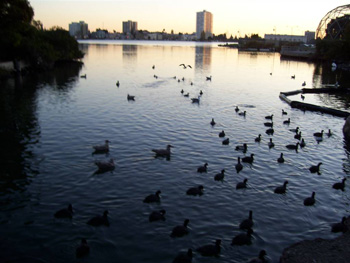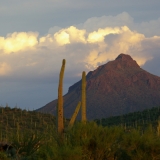| Location: Oakland, CA | Date: Wednesday, March 26, 2008 |
| Habitats: estuary-lake, open parkland, small islands | Time: 10am-11:30am |
| Weather: sunny, warm, beautiful | Wind: none |
| Observer: TP | |
| Birds Observed: (not in AOU or family order) |
| Cormorants, DC (C) | Gulls, Western | Amer. G Finch |
| Pied-billed Grebes | Horned Grebe? | Rock Doves |
| Great Egret | Canvasback (sev) | Canada Geese (A) |
| White Pelicans | Ruddies (A) | Coots (A) |
| Mallards (sev) | Lesser Scaup (P) | Towhee, Brown |
| BC Night Herons (sev) | Muscovy Duck (I) | Forster’s Tern (P) |
| Bufflehead (sev) | Ring-billed Gulls (A) | Robin |
| Greater Scaup (sev) | Com. Goldeneye | Black Phoebe |
| Mourning Dove | Crow | Starlings (C) |
| House Sparrow (I) | Bushtits (flock) | |
| Song Sparrow (H) |
A: abundant. H: hear. sev: several. C: common. sp: species. P: probably. (?) ID questionable. S: singing. F: flying. M: male. F: female. ! : Unexpected. * With young/immature. I: Introduced, not native to the area

Comments:
This trip was the second of the Birding class for the new semester. Lake Merritt is easy, convenient and from late fall to early spring has a large amount of birds in a small place. Therefore I usually schedule one trip early in the year. I still find it amazing that in the heart of a city of half a million people, you can find such a large and diverse number of birds. The totals for the day were about typical, sometimes you get more, sometimes less. It’s great to go over to the park area too, you can see lots of songbirds on a good day, like kinglets, yellow-rumps, various woodpeckers, occasionally nuthatches, goldfinches, sparrows, and so forth. However, we didn’t have time, we just did the waterfront by the nature center. The DCCs seem to be nesting already, maybe 20 or so occupying nests in the trees on the islands in the lake. This seems a little early, though. They are slowly killing all the trees with their whitewash. Not sure about the Horned Grebe (Eared are here too), it was a mile away out on the lake, but I noticed a few yellow feathers around the eye – breeding plumage starting. Didn’t see the Barrow’s Goldeneye, sometimes they’re on the other side of the lake. No swallows, no hummingbirds, no Blue Herons or Kingfishers, no sandpipers either, but the tide was only down from the high-water mark by a foot or two. I think some of the ducks have already left for the north, but you’d have to do a survey of the whole lake and nearby estuary to tell for sure (and over a period of time, too).
Saw the Muscovy duck (in the enclosure), but not the Egyptian geese. I explained to the class how the lake, with its open water, relative protection and central location (not to mention free food at the nature center), attracts “escapees” from wildfowl collections from various parts of the bay. I remember the Black Swan that showed up some years ago! Even in the middle of the city, you never know what will show up!
It’s old home week when I return here, since we lived up the hill when we first arrived from back East. The kids were born here, they were just babies. I got to know the birds at the lake by coming down here a lot with the kids. I know all the streets by heart; I think Piedmont is my favorite, it’s vibrant, it’s got a little of everything. The lake, the neighborhood, it’s great, I love it.

